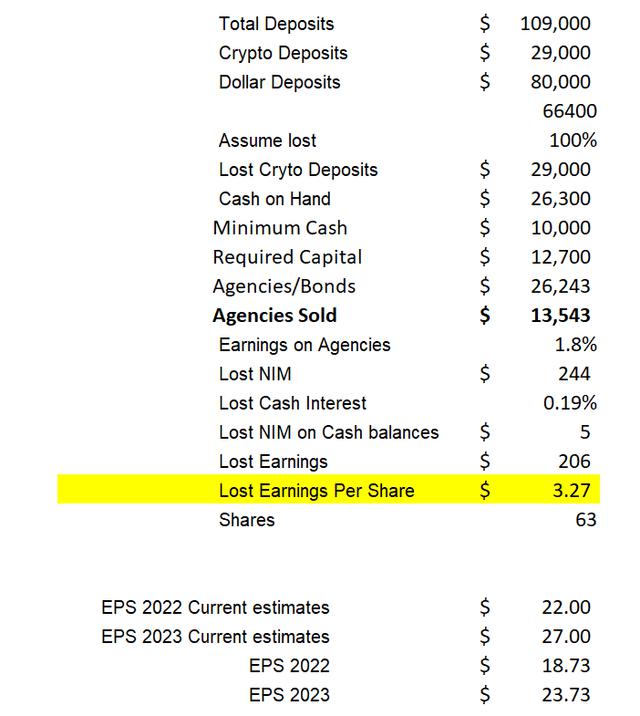For background, we wrote this up originally in November 2020 here, recommending investors purchase this high quality growth bank trading at a value multiple. We wrote that it could be a double, and as of today it is up almost 100% since then. We still like it and added shares last week.
TerraUSD Collapse
We spoke to Signature Bank (NASDAQ:SBNY) on the heels of this week's collapse in "stablecoin" TerraUSD (UST-USD). Designed to be pegged to the dollar, TerraUSD somehow broke the buck. This crypto is an algorithmic driven stable coin, whereby the creators of TerraUSD mint or remove tokens from the market in order to maintain a 1:1 price to the dollar ratio. Importantly, TerraUSD has no actual US dollars backing its value.
With the backers of TerraUSD holding Bitcoin (BTC-USD) as only a partial reserve against TerraUSD, now they are deemed to be sellers of Bitcoin. This created fear and a flush of many cryptos in the past few week. TerraUSD supposedly now is worthless (trading under 1c). Bitcoin has plummeted to $29,000, down well over 50% from its highs.
As background, Signature Bank has a banking service called Signet. Signet offers institutions the ability to post crypto deposits into these accounts. It uses Ethereum (ETH-USD) based blockchain technology and so can process payments (without fees) in real time, 24-7. According to Signature Bank, Signet wouldn’t offer services to a lower credit customer like Terra (although they said legally they cannot disclose their depositors by name).
So, we think the fear that SBNY holds TerraUSD deposits is highly unlikely based on the company’s comments.
In total, Signature Bank has $29 billion in cryptocurrency deposits in various Signet accounts. These include miners, funds that want to invest in cryptos, and exchanges among others. $7 billion of these are related to stable coins, and the fear of course is that this $7 billion is related to TerraUSD. Again, this seems very unlikely, and we were told by the company that they can disclose that they bank stable coins TrueUSD and USD Coin. Both of these are backed by real actual US dollars.
Both of these cryptocurrencies continue to trade at $1 as of today.
Run On The Bank?
The next level of worry surrounding their Signet business is simply the concern of a run on the bank. We ran through a scenario whereby Signature Bank's crypto customers decide to take their money out of the bank and go elsewhere.
That seems pretty unlikely, but in a year let’s just assume that 100% of Signature’s crypto deposits flee. Mind you, this is a bit of an extreme assumption, as cryptos continue to flow – selling here and buying there, even lower prices means that they still exist.
Coinbase (COIN) has $6 billion in cash, and as an exchange, has a lot more risk than their bank. As an example, say a large institution sells Bitcoins on Coinbase. Coinbase has to fund this seller with US dollars (which they might have to take out of their bank account at Signature Bank). But then the buyer uses dollars to pay for those coins that are sold on Coinbase. So, COIN gets dollars on the other side of the trade, and those dollars would flow right back into the bank.
But again, just taking this example to the extreme, that COIN decides to move to another bank, along with every other miner and institution that has deposits at Signature Bank. (They have zero retail crypto deposits).
That would imply $29 billion of lost deposits out of their $109 billion in total. SBNY confirmed that they still only have one $100 million loan backed by cryptocurrency (out of a total of $66.4 BILLION in loans). That is 0.15%, literally nothing.

That means we don't have to worry about the asset side of the balance sheet.
SBNY suggests that they really don’t charge fees on these deposits, and mostly have this cash sitting on their balance sheet. So there would not be an impact to fee income.
As of quarter end, the company had $26.3 billion in cash on the books. They believe that they would probably have to keep $10 billion at least in cash for regulatory purposes. That means that if SBNY lost $29 billion in crypto deposits, then they would have to sell some investments on the balance sheet, or fund them with corporate borrowings.
Here is the math:
The Q1 earnings report details cash earnings yields and the 1.6% they earn on Agencies today. Here is the asset side of the balance sheet.
We highlighted the relevant assets: Securities either available for sale or held to maturity total $26 billion, plus another $26 billion in cash and equivalents.
The company suggests they would like to keep $10 billion in cash on the balance sheet at all times (but admit that they could go as low as $7.5 billion).
Here are their liabilities, with minimal debt and a lot of non-interest bearing, and non-crypto deposits.
Per our math, taking out their crypto business, its deposits, in its entirety implies about a $3.27 hit to EPS at current yields/spreads (1.8%). The company confirmed our methodology here and said it would be "a few bucks."
EPS assuming this happened over the course of this year might imply $23.73 in 2023, down from current Street estimates of $27. But at the current stock price, $200, Signature Bank is trading at ~9x earnings. Historically this is about the lowest it has ever traded. And assumes that their crypto business completely disappears.
We also believe that the company would likely just borrow a bit in the bond market to fund whatever cash they needed (per what they said they would probably do). Currently a financing would cost them about 2.5%, and would allow Signature bank to keep their Agencies book intact.
Would the growth rate be affected by losing Signet? At 9x earnings, the stock appears priced for a lot of risk and zero growth anyway. It usually trades between 10-15x, so the market already seems to be implying $12-19 in EPS, a very large hit.
We view fair value as 12-16x, especially given its growth track record and superior business model. Loan balances grew 3% in the first quarter (excluding PPP loans), annualized a growth rate of 12%. That is impressive. From 2015 to 2021, earnings doubled at the company from $7.37 to $15.03, a 15% CAGR.
Indeed, this should be worth at least 15x. We recommend reading our earlier articles here illustrating the superior ROE's and efficiency ratio at Signature Bank.
We encouraged management put out an 8-K to provide investors with an update. They are presenting at a Wells Fargo conference on Wednesday, and said that they may put something out before then (I assume that morning or the day before).
They ruled out the need to do an equity offering. Yellen also stated that there are no real risks to the financial system from cryptos today.
At the end of the day, even without any crypto deposits, SBNY holds $80 billion in dollar deposits and has $64 billion in loans. The balance sheet is really excellent here.
Conclusion
SBNY stock is far more correlated to cryptocurrency prices than it should be. They own zero crypto assets on the balance, and essentially no loans. We sense opportunity, and recommend adding shares. It certainly “feels” risky, and it may make sense not to catch the falling knife. But the buys we make that are the most uncomfortable, often are the best ones. I can tell you that buying Crestwood preferreds was a scary trade in March 2020 (especially as it fell to $4 after buying shares at $6 and $5).
As we confirmed, there is no credit exposure to cryptos on the side of Signature Bank, merely deposits that could flee. That cost, assuming a 100% exit from Signet, impacts earnings by 15%. With the stock down roughly 50% from its highs in January, and down 31% in a month, we argue that SBNY is dramatically oversold.
With the carnage and panic of late, expect perhaps additional volatility. But in a year or two, we are hard-pressed seeing this equity worth less than $300 a share. Long term we continue to target $400-500. This is a volatile but excellent buy and hold stock.




